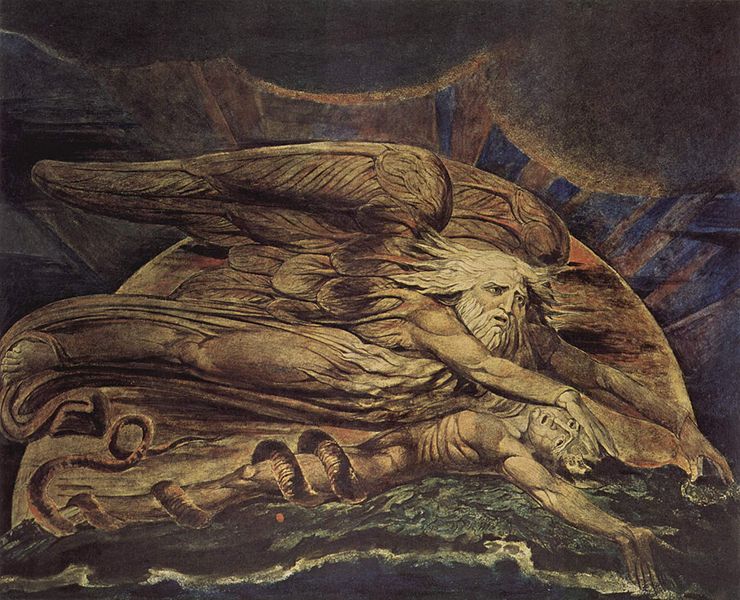In Blake's system of thought error runs its course before it is replaced with a new pattern of thinking, behaving, or interpreting which then becomes the dominant ethos. The Seven Eyes of God are Blake's stages in man's understanding of the concept of God. He found the names of the seven stages of development in the Old Testament. Blake's stages include the pre-history of the world before man was created as do passages in the Bible.
Jerusalem, Plate 55, (E 205)
"Then far the greatest number were about to make a Separation
And they Elected Seven, calld the Seven Eyes of God;
Lucifer, Molech, Elohim, Shaddai, Pahad, Jehovah, Jesus"
From this list of the Eyes, we see that the Elohim who created mankind
was the third of the stages of development. Jehovah or Yahweh, the
name most familiar from the Old and New Testaments was sixth in the
line of development. The word Jehovah, a pronunciation of YHWH,
first appears in the twenty-second chapter of Genesis in the King
James Version of the Bible. Blake apparently sees each of the Eyes
of God a having both negative and positive connotations. Frye states
that: "The sixth of these, the vision of Jehovah or the Hebrew
religious imagination, is, like the Palamabron of Milton,
who is associated with Moses, a mixture of genuine imagination and
moral law, and was purified into the former by Jesus." (Fearful
Symmetry, Page 360) Exodus 6
[2] And God spake unto Moses, and said unto him, I am the LORD:
[3] And I appeared unto Abraham, unto Isaac, and unto Jacob, by the name of God
Almighty [El Shaddai], but by my name JEHOVAH was I not known to them.
 |
| Wikipedia Commons Large Color Printed Drawings Elohim Creating Adam |
The Ghost of Abel shows a transition from the concepts which dominated the Elohim to those recognized in Jehovah. Although the Elohim were the creator God, they also epitomized the God of vengeance. The two contrary characteristics of Jehovah were expressions of the moral law and of mercy.
Jerusalem, Plate 27, (E 171)
"Albion was the Parent of the Druids; & in his Chaotic State of
Sleep Satan & Adam & the whole World was Created by the Elohim."
Jerusalem, Plate 60, (E 211)
"Thus spake Jerusalem, & thus the Divine Voice replied.
Mild Shade of Man, pitiest thou these Visions of terror & woe!
Give forth thy pity & love. fear not! lo I am with thee always.
Only believe in me that I have power to raise from death
Thy Brother who Sleepeth in Albion: fear not trembling Shade
Plate 61
Behold: in the Visions of Elohim Jehovah, behold Joseph & Mary
And be comforted O Jerusalem in the Visions of Jehovah Elohim"
Jerusalem, Plate 73, (E 228)
"Where Luvahs World of Opakeness grew to a period: It
Became a Limit, a Rocky hardness without form & void
Accumulating without end: here Los. who is of the Elohim
Opens the Furnaces of affliction in the Emanation
Fixing The Sexual into an ever-prolific Generation
Naming the Limit of Opakeness Satan & the Limit of Contraction
Adam, who is Peleg & Joktan: & Esau & Jacob: & Saul & David"
.

No comments:
Post a Comment